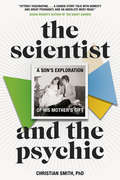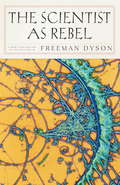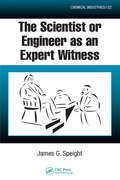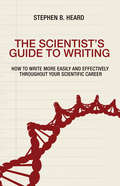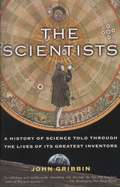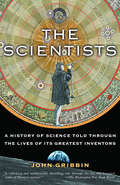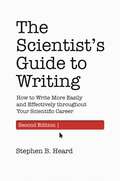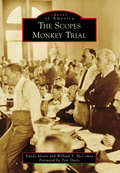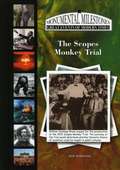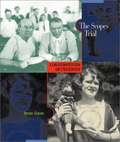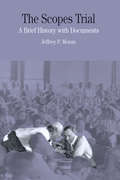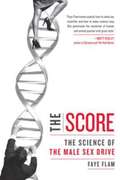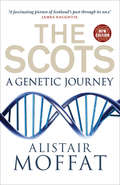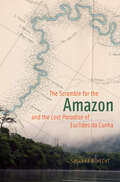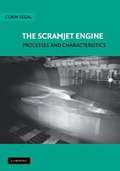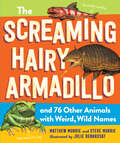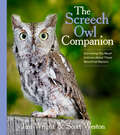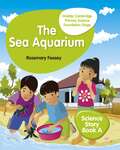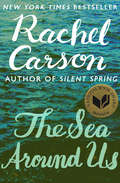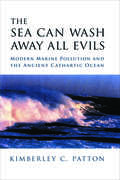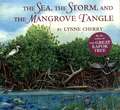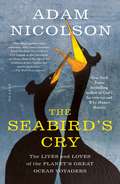- Table View
- List View
The Scientist and the Psychic: A Son's Exploration of His Mother's Gift
by Christian SmithWeaving together the story of his fractured relationship to his mother with research into her paranormal abilities, Dr. Christian Smith has created, in The Scientist and the Psychic, a captivating, one-of-a-kind memoir of belief, skepticism and familial love.Christian Smith realized his mother was different in the autumn of 1977 when he was eight years old. Before then, he'd witnessed séances at home and the kids at school sometimes teased him about his mom being a witch--so he sensed that his life wasn't typical. But it wasn't until he was backstage at a renowned concert venue in Toronto, watching from behind a curtain as Geraldine commanded an audience of 2,000 with her extrasensory readings, that he understood she was special. As Geraldine's only child, he would assume the role of the quiet observer while she guided a live CBC broadcast of a séance; made startling and consistently accurate predictions; and eventually moved to LA to work with the parents of murder victims--and with convicted murderer Jeffrey R. MacDonald. Over time, the high profile and emotionally depleting work affected Geraldine's health and relationships. Addiction took over her life, and her son pulled away. Fast forward to the present day: Christian is a molecular biologist and Geraldine is retired and in poor health. They are closer than they've ever been, and now he gives us the story of her undeniable perceptual abilities and pioneering work as a psychic--and endeavours to make scientific sense of it.
The Scientist as Rebel
by Freeman J. DysonFrom Galileo to today's amateur astronomers, scientists have been rebels, writes Freeman J. Dyson. Like artists and poets, they are free spirits who resist the restrictions their cultures impose on them. In their pursuit of nature's truths, they are guided as much by imagination as by reason, and their greatest theories have the uniqueness and beauty of great works of art.Dyson argues that the best way to understand science is by understanding those who practice it. He tells stories of scientists at work, ranging from Isaac Newton's absorption in physics, alchemy, theology, and politics, to Ernest Rutherford's discovery of the structure of the atom, to Albert Einstein's stubborn hostility to the idea of black holes. His descriptions of brilliant physicists like Edward Teller and Richard Feynman are enlivened by his own reminiscences of them. He looks with a skeptical eye at fashionable scientific fads and fantasies, and speculates on the future of climate prediction, genetic engineering, the colonization of space, and the possibility that paranormal phenomena may exist yet not be scientifically verifiable. Dyson also looks beyond particular scientific questions to reflect on broader philosophical issues, such as the limits of reductionism, the morality of strategic bombing and nuclear weapons, the preservation of the environment, and the relationship between science and religion. These essays, by a distinguished physicist who is also a prolific writer, offer informed insights into the history of science and fresh perspectives on contentious current debates about science, ethics, and faith.
The Scientist or Engineer as an Expert Witness (Chemical Industries)
by James G SpeightThe increased technical nature of litigation coupled with an increase in the number of cases have given rise to the need for a book specifically written for scientists and engineers called to testify as expert witnesses. Unique in its approach, The Scientist or Engineer as an Expert Witness assists these experts in clearly conveying the often compl
The Scientist's Guide to Writing: How to Write More Easily and Effectively throughout Your Scientific Career
by Stephen B. HeardThe ability to write clearly is critical to any scientific career. The Scientist's Guide to Writing provides practical advice to help scientists become more effective writers so that their ideas have the greatest possible impact.Drawing on his own experience as a scientist, graduate adviser, and editor, Stephen Heard emphasizes that the goal of all scientific writing should be absolute clarity; that good writing takes deliberate practice; and that what many scientists need are not long lists of prescriptive rules but rather direct engagement with their behaviors and attitudes when they write. He combines advice on such topics as how to generate and maintain writing momentum with practical tips on structuring a scientific paper, revising a first draft, handling citations, responding to peer reviews, managing coauthorships, and more.In an accessible, informal tone, The Scientist's Guide to Writing explains essential techniques that students, postdoctoral researchers, and early-career scientists need to write more clearly, efficiently, and easily.Emphasizes writing as a process, not just a productEncourages habits that improve motivation and productivityExplains the structure of the scientific paper and the function of each partProvides detailed guidance on submission, review, revision, and publicationAddresses issues related to coauthorship, English as a second language, and more
The Scientists: A History of Science Told Through the Lives of Its Greatest Inventors
by John GribbinA wonderfully readable account of scientific development over the past five hundred years, focusing on the lives and achievements of individual scientists, by the bestselling author of In Search of Schrödinger's Cat. In this ambitious new book, John Gribbin tells the stories of the people who have made science, and of the times in which they lived and worked. He begins with Copernicus, during the Renaissance, when science replaced mysticism as a means of explaining the workings of the world, and he continues through the centuries, creating an unbroken genealogy of not only the greatest but also the more obscure names of Western science, a dot-to-dot line linking amateur to genius, and accidental discovery to brilliant deduction. By focusing on the scientists themselves, Gribbin has written an anecdotal narrative enlivened with stories of personal drama, success and failure. A bestselling science writer with an international reputation, Gribbin is among the few authors who could even attempt a work of this magnitude. Praised as "a sequence of witty, information-packed tales" and "a terrific read" by The Times upon its recent British publication, The Scientists breathes new life into such venerable icons as Galileo, Isaac Newton, Albert Einstein and Linus Pauling, as well as lesser lights whose stories have been undeservedly neglected. Filled with pioneers, visionaries, eccentrics and madmen, this is the history of science as it has never been told before.
The Scientists: A History of Science Told Through the Lives of Its Greatest Inventors (Britannica Guides)
by John GribbinA wonderfully readable account of scientific development over the past five hundred years, focusing on the lives and achievements of individual scientists, by the bestselling author of In Search of Schrödinger’s CatIn this ambitious new book, John Gribbin tells the stories of the people who have made science, and of the times in which they lived and worked. He begins with Copernicus, during the Renaissance, when science replaced mysticism as a means of explaining the workings of the world, and he continues through the centuries, creating an unbroken genealogy of not only the greatest but also the more obscure names of Western science, a dot-to-dot line linking amateur to genius, and accidental discovery to brilliant deduction.By focusing on the scientists themselves, Gribbin has written an anecdotal narrative enlivened with stories of personal drama, success and failure. A bestselling science writer with an international reputation, Gribbin is among the few authors who could even attempt a work of this magnitude. Praised as “a sequence of witty, information-packed tales” and “a terrific read” by The Times upon its recent British publication, The Scientists breathes new life into such venerable icons as Galileo, Isaac Newton, Albert Einstein and Linus Pauling, as well as lesser lights whose stories have been undeservedly neglected. Filled with pioneers, visionaries, eccentrics and madmen, this is the history of science as it has never been told before.
The Scientists: An Epic Of Discovery
by Andrew RobinsonAn intriguing and illuminating read for science buffs, those fascinated by the lives and minds of great men and women, and anyone curious about how we came to understand the physical world The ideas, experiments, and inventions of great scientists have revolutionized our understanding of the world around us. Theories, discoveries, and technologies—from relativity, the genetic code, and the periodic table to synthetic drugs, nuclear weapons, and brain scans—have transformed the physical world and our lives. Copernicus, Crick, Watson, Galileo, Marie Curie: these are some of the forty pioneers behind modern science whose stories are explored here. The scientists come from around the globe and represent multiple nationalities—American, English, German, French, Dutch, Czech, Indian, Japanese, and more. Often unorthodox thinkers, they frequently had to struggle against hostile contemporaries to gain recognition for their ideas and discoveries. All the major scientific disciplines are covered, including astronomy, biology, biochemistry, chemistry, computing, ecology, geology, medicine, neurology, physics, and psychology, as well as mathematics.
The Scientist’s Guide to Writing, 2nd Edition: How to Write More Easily and Effectively throughout Your Scientific Career
by Stephen B. HeardAn updated and expanded edition of the acclaimed writing guide for scientistsThe Scientist’s Guide to Writing explains the essential techniques that students, postdocs, and early-career scientists need to write more clearly, efficiently, and easily. Now fully updated and expanded, this incisive primer offers practical advice on such topics as generating and maintaining writing momentum, structuring a scientific paper, revising a first draft, handling citations, responding to peer reviews, managing coauthorships, and more. The ability to write clearly is critical to any scientific career. The Scientist’s Guide to Writing shows scientists how to become better writers so that their ideas have the greatest possible impact.New chapters discuss effective reading, choosing the right journal for your research, and the advantages and disadvantages of posting preprintsProvides additional advice on reporting statistical results, dealing with conflicting peer reviews, managing coauthorships, writing with English as an additional language, and moreEmphasizes writing as a process, not just a productEncourages habits that improve motivation and productivityOffers detailed guidance on submission, review, revision, and publicationIncludes a wealth of new exercises
The Scopes Monkey Trial (Images of America)
by Tom Davis Randy Moore William MccomasThe 1925 case against high school coach and science teacher John Scopes, arrested for teaching evolution in defiance of a Tennessee state law, was America's original "Trial of the Century." The proceedings began as a publicity stunt but grew into a landmark event in the nation's history. The trial featured three-time presidential candidate and fundamentalist leader William Jennings Bryan, who argued on behalf of the prosecution, and famed agnostic attorney Clarence Darrow, who helped defend Scopes. Although the Scopes case produced no legal precedent, the trial has been analyzed by historians, praised and vilified by politicians and preachers, cited in countless legal, political, and theological skirmishes, and retold in plays, movies, museum exhibits, and television documentaries. Images of America: The Scopes Monkey Trial examines the events that captured the attention of the world and still have much to teach us today.
The Scopes Monkey Trial (Monumental Milestones: Great Events of Modern Times)
by Jim WhitingOne of the most famous trials in U.S. history took place in a tiny town in Tennessee in 1925. Dayton was the site of what became known as the Scopes Monkey Trial. The defendant, John T. Scopes, was accused of violating a recently passed state law. This law made it illegal to teach the theory of evolution. Under most circumstances, few people would have paid any attention. Several of Dayton's leading citizens saw a chance to put their town on the map. They were successful. Two of the country's most famous people-William Jennings Bryan and Clarence Darrow-soon became involved. Dozens of reporters poured into Dayton from all over the country. It was the first trial to receive live media coverage. Scopes was found guilty. He had to pay a small fine. But the issues about evolution that the trial raised are still debated today.
The Scopes Trial (Cornerstones of Freedom, 2nd Series)
by Renee GravesA description of the historic 1925 trial in which a Tennessee high school biology teacher was accused of violating state law by teaching Darwin's theory of evolution.
The Scopes Trial: A Brief History With Documents (The Bedford Series In History And Culture)
by Jeffrey P. MoranThe Scopes trial shocked America. Tennessee schoolteacher John Scopes brought the question of teaching evolution in schools to every dinner table, and it remains an essential topic in any course on American History, the History of Education, and Religious History. This volume’s lively interpretative introduction provides an analysis of the trial and its impact on the moral fiber of the country and the educational system, and examines the race and gender issues that shook out of the debate. The editor has excerpted the crucial exchanges from the trial transcript itself, and includes these along with reactions to the trial, taken from newspaper reports, letters, and magazine articles. Telling political cartoons and evocative photographs add a colorful dimension to this collection, while a chronology of events, questions for consideration, and a bibliography provide strong pedagogical support.
The Score
by Faye FlamA smart, witty, and fresh look at the male side of the male-female relationship from a science writer at The Philadelphia Inquirer.In The Score, Faye Flam examines how the desire to "score" has profoundly shaped males over millions of years. Sweeping from the origin of the sexes to the sexual foibles of twenty-first-century humans, Flam, a science writer at The Philadelphia Inquirer, shows how a small difference in the size of the first sperm and eggs resulted in an evolutionary tradeoff that has affected both males and females. Because males of most species invest less in reproduction than females, they have to invest more up front to get sex-whether by jumping through hoops to prove that they'll be a good father, fighting to near death with rivals, or paying a couple thousand dollars for a class on how to pick up chicks à la the pickup artists in Neil Strauss's The Game. Within this tug-of-war context, Flam explores a wide range of male behaviors and courtship strategies and ultimately reveals that males have been shaped by competing for the preferences of the female sex. But after all this sex-propelled evolution, we're still stuck in a troublesome suspension between monogamy and promiscuity-and it's this tension that explains the contradictions of the modern man.
The Score: The Science of the Male Sex Drive
by Faye FlamA smart, witty, and fresh look at the male side of the male-female relationship from a science writer at The Philadelphia Inquirer.In The Score, Faye Flam examines how the desire to "score" has profoundly shaped males over millions of years. Sweeping from the origin of the sexes to the sexual foibles of twenty-first-century humans, Flam, a science writer at The Philadelphia Inquirer, shows how a small difference in the size of the first sperm and eggs resulted in an evolutionary tradeoff that has affected both males and females. Because males of most species invest less in reproduction than females, they have to invest more up front to get sex-whether by jumping through hoops to prove that they'll be a good father, fighting to near death with rivals, or paying a couple thousand dollars for a class on how to pick up chicks à la the pickup artists in Neil Strauss's The Game. Within this tug-of-war context, Flam explores a wide range of male behaviors and courtship strategies and ultimately reveals that males have been shaped by competing for the preferences of the female sex. But after all this sex-propelled evolution, we're still stuck in a troublesome suspension between monogamy and promiscuity-and it's this tension that explains the contradictions of the modern man.
The Scots: A Genetic Journey
by Alistair MoffatThis unique &“fusion of science and the physical history&” traces the story of the Scots through their DNA (Sunday Herald). An almost limitless archive of our history lies hidden inside our bodies, and this book traces the ancient story of Scotland from that scientific viewpoint. The mushrooming of genetic studies, of DNA analysis, is rewriting history in spectacular fashion. In Scotland: A Genetic Journey, Alistair Moffat explores the history that is printed on our genes, and in a remarkable new approach, uncovers the detail of where Scots are from, where they have journeyed, and who they are—and in so doing, vividly colors in a DNA map of Scotland. &“[Moffat] is wonderfully able to communicate the epic elements of the story.&” —Scotsman
The Scramble for the Amazon and the Lost Paradise of Euclides da Cunha
by Susanna B. HechtA “compelling and elegantly written” history of the fight for the Amazon basin and the work of a brilliant but overlooked Brazilian intellectual (Times Literary Supplement, UK).The fortunes of the late nineteenth century’s imperial powers depended on a single raw material—rubber—with only one source: the Amazon basin. This scenario ignited a decades-long conflict that found Britain, France, Belgium, and the United States fighting with and against the new nations of Peru, Bolivia, and Brazil for the forest’s riches. In the midst of this struggle, the Brazilian author and geographer Euclides da Cunha led a survey expedition to the farthest reaches of the river. The Scramble for the Amazon tells the story of da Cunha’s terrifying journey, the unfinished novel born from it, and the global strife that formed the backdrop for both. Haunted by his broken marriage, da Cunha trekked through a beautiful region thrown into chaos by guerrilla warfare, starving migrants, and native slavery. All the while, he worked on his masterpiece, a nationalist synthesis of geography, philosophy, biology, and journalism entitled Lost Paradise. Hoping to unveil the Amazon’s explorers, spies, natives, and brutal geopolitics, Da Cunha was killed by his wife’s lover before he could complete his epic work. once the biography of Da Cunha, a translation of his unfinished work, and a chronicle of the social, political, and environmental history of the Amazon, The Scramble for the Amazon is a work of thrilling intellectual ambition.
The Scramjet Engine: Processes and Characteristics
by Corin SegalThe renewed interest in high-speed propulsion has led to increased activity in the development of the supersonic combustion ramjet engine for hypersonic flight applications. In the hypersonic regime the scramjet engine's specific thrust exceeds that of other propulsion systems. This book, written by a leading researcher, describes the processes and characteristics of the scramjet engine in a unified manner, reviewing both the theoretical and experimental research. The focus is on the phenomena that dictate the thermo-aerodynamic processes encountered in the scramjet engine, including component analyses and flowpath considerations; fundamental theoretical topics related to internal flow with chemical reactions and non-equilibrium effects, high-temperature gas dynamics, and hypersonic effects are included. Cycle and component analyses are further described, followed by flowpath examination. Finally, the book reviews the current experimental and theoretical capabilities and describes ground testing facilities and computational fluid dynamics facilities developed to date for the study of time-accurate, high-temperature aerodynamics.
The Scream (Forbidden Doors, #9)
by Bill Myers"He has no concept of the danger he's in." Rebecca Williams is about to learn this first hand. She and her brother, Scott, are going to L.A. to the hottest concert in the country. What could be better than that? Rebecca knows she should be excited, but since she read Z's e-mail all she feels is apprehension. They've been asked to help the drummer for The Scream, the nation's top rock band. Rebecca has faced danger before -- so why does this assignment have her so on edge? Join Becka and Scott as they learn valuable truths about the lure of the supernatural, the reality of spiritual warfare -- and the truth of victory in Jesus. Ouija boards, witchcraft, voodoo, vampires and more are covered in these edge-of-your-seat thrillers for teens. Recommended for ages 12 and up.
The Screaming Hairy Armadillo and 76 Other Animals with Weird, Wild Names
by Matthew Murrie Steve MurrieA fascinating compendium featuring over 70 unusual animal species. What's in a name? This lively, illustrated celebration is jam-packed with creatures notable for their bizarre, baffling, and just-plain-funny names. Meet the White-Bellied Go-Away Bird, whose cry sounds like someone screaming, "Go away!" Or the Aye-Aye, whose name means "I don't know" in Malagasy because no one wants anything to do with this bad-luck creature. Some are obvious, if still weird––guess what the Fried Egg Jellyfish looks like. Others sound like an inside joke: It's easy to figure out what was on the taxonomist's mind when he christened a fly he discovered Pieza Pie. Along the way you'll learn all about these curiously named animals' just-as-curious habits, appearances, and abilities.
The Screech Owl Companion: Everything You Need to Know about These Beneficial Raptors
by Jim Wright Scott WestonThis must-read for birders features a complete guide to attracting, understanding, and protecting owls. The call of an owl evokes mystery; seeing one in the wild inspires wonder. Of the top ten birds people hope to see, three are owls. Although they may be out of sight, owls are widespread throughout North America—and screech owls are the most likely to make their homes near humans. In this book, experts Jim Wright and Scott Weston show you how to attract them to nest in your yard, year after year.The Screech Owl Companion introduces screech owls, show how to distinguish them from other species, shares fun lore and legend, and provides step-by-step instructions for making your yard screech ready. You&’ll learn how to build a nest box and install a simple nest cam that you can monitor from your cell phone to watch when owls move in, lay eggs, and hatch.
The Sea Aquarium (Hodder Cambridge Primary Science Ser.)
by Rosemary FeaseyExplore, support and consolidate Early Years science themes with a colourful story for ages 4-5, containing key concepts and practice opportunities. • Practise key science concepts with simple question prompts on each page and activities at the end of the book. • Support the science themes covered in Activity Book A and the Teacher’s Pack. The Sea Aquarium How can Rika help the sea turtles? Books in the Hodder Cambridge Primary Science series for the Foundation Stage: Activity Book A – 9781510448605 Activity Book B – 9781510448612 Activity Book C – 9781 510448629 Story Book A The Sea Aquarium – 9781510448636 Story Book B The Toy Box – 9781 510448643 Story Book C Dinosaur Adventure – 9781510448650 Teacher's Pack – 9781510448667 HODDER EDUCATION e: education@bookpoint.co.uk w: hoddereducation.com
The Sea Around Us
by Rachel CarsonNational Book Award Winner and New York Times Bestseller: Explore earth&’s most precious, mysterious resource—the ocean—with the author of Silent Spring. With more than one million copies sold, Rachel Carson&’s The Sea Around Us became a cultural phenomenon when first published in 1951 and cemented Carson&’s status as the preeminent natural history writer of her time. Her inspiring, intimate writing plumbs the depths of an enigmatic world—a place of hidden lands, islands newly risen from the earth&’s crust, fish that pour through the water, and the unyielding, epic battle for survival. Firmly based in the scientific discoveries of the time, The Sea Around Us masterfully presents Carson&’s commitment to a healthy planet and a fully realized sense of wonder. This ebook features an illustrated biography of Rachel Carson including rare photos and never-before-seen documents from the Beinecke Rare Book and Manuscript Library at Yale University.
The Sea Can Wash Away All Evils: Modern Marine Pollution and the Ancient Cathartic Ocean
by Kimberley Christine PattonKimberley Patton examines the environmental crises facing the world's oceans from the perspective of religious history. Much as the ancient Greeks believed, and Euripides wrote, that "the sea can wash away all evils," a wide range of cultures have sacralized the sea, trusting in its power to wash away what is dangerous, dirty, and morally contaminating. The sea makes life on land possible by keeping it "pure."Patton sets out to learn whether the treatment of the world's oceans by industrialized nations arises from the same faith in their infinite and regenerative qualities. Indeed, the sea's natural characteristics, such as its vast size and depth, chronic motion and chaos, seeming biotic inexhaustibility, and unique composition of powerful purifiers-salt and water-support a view of the sea as a "no place" capable of swallowing limitless amounts of waste. And despite evidence to the contrary, the idea that the oceans could be harmed by wasteful and reckless practices has been slow to take hold. Patton believes that environmental scientists and ecological advocates ignore this relationship at great cost. She bases her argument on three influential stories: Euripides' tragedy Iphigenia in Tauris; an Inuit myth about the wild and angry sea spirit Sedna who lives on the ocean floor with hair dirtied by human transgression; and a disturbing medieval Hindu tale of a lethal underwater mare. She also studies narratives in which the sea spits back its contents-sins, corpses, evidence of guilt long sequestered-suggesting that there are limits to the ocean's vast, salty heart. In these stories, the sea is either an agent of destruction or a giver of life, yet it is also treated as a passive receptacle. Combining a history of this ambivalence toward the world's oceans with a serious scientific analysis of modern marine pollution, Patton writes a compelling, cross-disciplinary study that couldn't be more urgent or timely.
The Sea, The Storm, And The Mangrove Tangle
by Lynne CherryA look into a unique ecosystem, one that is endangered in many places <P> A seed is jostled from a branch of a mangrove tree and floats to a lagoon in the Caribbean Sea. It takes root, sprouts leaves, and slowly begins to grow. Over many years, the mangrove will provide a home and nourishment for numerous creatures of land and sea. Among its roots come to live fiddler crabs and shrimp; in its branches dwell lizards and hummingbirds. Soon the tree is dropping seeds of its own, and other mangroves are growing, creating a tangle whose benefits extend even to large mammals like dolphins and manatees. There are endpaper maps that indicate where mangroves are located and the names of common animals and plants found in them. <P> Ever threatened by hurricanes and even more by human destruction, the mangroves of our planet are endangered, but in Lynne Cherry's richly illustrated story one such habitat survives, giving readers hope and inspiration for preservation of these ecosystems in the real world.
The Seabird's Cry: The Lives and Loves of the Planet's Great Ocean Voyagers
by Adam NicolsonLife itself could never have been sustainable without seabirds. As Adam Nicolson writes: "They are bringers of fertility, the deliverers of life from ocean to land."A global tragedy is unfolding. Even as we are coming to understand them, the number of seabirds on our planet is in freefall, dropping by nearly 70% in the last sixty years, a billion fewer now than there were in 1950. Of the ten birds in this book, seven are in decline, at least in part of their range. Extinction stalks the ocean and there is a danger that the grand cry of the seabird colony, rolling around the bays and headlands of high latitudes, will this century become little but a memory.Seabirds have always entranced the human imagination and NYT best-selling author Adam Nicolson has been in love with them all his life: for their mastery of wind and ocean, their aerial beauty and the unmatched wildness of the coasts and islands where every summer they return to breed. The seabird’s cry comes from an elemental layer in the story of the world.Over the last couple of decades, modern science has begun to understand their epic voyages, their astonishing abilities to navigate for tens of thousands of miles on featureless seas, their ability to smell their way towards fish and home. Only the poets in the past would have thought of seabirds as creatures riding the ripples and currents of the entire planet, but that is what the scientists are seeing now today.
